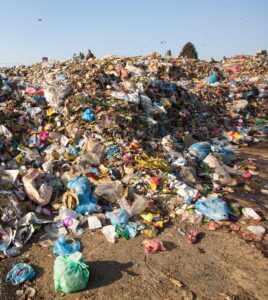MacRae talks with Bangor Daily about PFAS in landfills and wastewater treatment

Jean MacRae, associate professor of civil and environmental engineering at UMaine and Mitchell Center faculty fellow, recently spoke with the Bangor Daily News about two aspects of Maine’s ongoing PFAS crisis: PFAS in landfill leachate—the liquid runoff from landfilled waste—and in wastewater treatment.
MacRae is part of a Mitchell Center team that is researching PFAS in Maine, including the environmental, economic and social aspects of various management options.
Although PFAS can be removed from wastewater, or drinking water, these “forever chemicals” are very difficult to break down and must be disposed of.
“The issues with landfills are big because they’re really the only way to deal with PFAS contamination once it happens,” MacRae told the BDN. “Water can be treated to get PFAS out … by passing it through an activated carbon charcoal filter. And if you do that, you’ll stick the PFAS to the charcoal, but then you have contaminated charcoal. So where does that go?”
